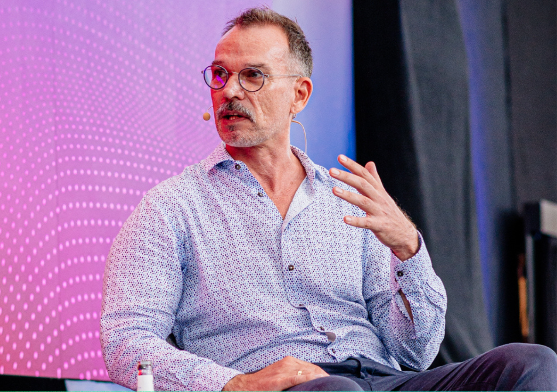Which hydrogen concepts are sustainable? How can the green transformation succeed? What alliances are needed for this? Many of these questions are still unanswered and will remain so for a while. For the Handelsblatt Wasserstoff Gipfel 2023, our CEO Uwe Kerkmann took a look at what it takes to be successful as a start-up in the market and where improvements are urgently needed.
Let’s not fool ourselves:
Our road to a thriving hydrogen economy is still long. The war in Ukraine, climate change and the resulting need to reduce CO2 emissions, political goals and the growing demand for alternative energies – all of this makes hydrogen a central topic. But in many cases, practical implementation is missing: a hydrogen infrastructure must be created, import routes clarified and new partnerships forged. In addition to the large-scale giga projects, innovation is also needed to drive forward medium-sized projects, decentralized approaches or specific use cases of hydrogen. Furthermore, increasing efficiency and reducing costs are key issues for the ramp-up of the hydrogen economy.
Start-ups close innovation gap
For this, the hydrogen market urgently needs innovation impulses. If we assume that only half of the technologies needed to achieve the climate targets are currently available, it is of utmost importance to work on the other half with all available resources.
This is where agile hydrogen start-ups come into play to show how we can produce and use hydrogen as cheaply and effectively as possible. And how we organize storage and transport to integrate hydrogen into our complex energy and industry system.
As H2UB – The #HYDROVERSE, the European hub for hydrogen start-ups, we have already been ‘on the market’ for two years. Through new technological approaches and a constantly growing community, we have gathered lots of ‘swarm knowledge’ to pass on our experience to founders.
What do H2 start-ups need to be successful?
- Building a strong team
Premise No. 1 for success: an outstanding team. This requires not only securing the best talents, but above all building a diverse team with complementary skills to complement each other in the multitude of challenges. - Secure funding
In the deep tech sector, high initial investments are often necessary to build prototypes or pilot plants. Investments in innovative hardware technologies are therefore more difficult to obtain than in digital solutions. It is best to start with a lead investor and build up further financing rounds from this position. You can achieve this with a focused corporate strategy, a convincing investment story and precise knowledge of the customers’ pain points. - Choosing the best support for yourself
The multitude of national and European structures, networks, or funding opportunities can be overwhelming. However, start-ups should take advantage of the variety of EU support programs. To know where in Europe the best framework conditions exist for your own technological solution, you need to spend some time researching. A strong European networking platform like H2UB helps. - Network and qualification
Through presence at industry events and in strategically chosen partnerships, you will be more visible. It helps to have a membership in associations or networks and to participate in start-up programs. In this newly developing hydrogen economy it is crucial to know the needs of your customers very well and address them with a solution. Do not underestimate good preparation and qualification to find the right corporate and financing partners. The H2UB offers accelerator programs, events, trade fair participations and delegation trips to support start-ups in this. - Expand your ecosystem
Many ideas for the further development of the hydrogen economy can only be implemented across industries and sectors. What is needed here is a comprehensive, versatile ecosystem and contacts to experienced market participants. The H2UB helps start-ups with its European network and strategic partnerships.
European hydrogen start-ups need more attention – from corporates, investors and politics. In contrast to other start-up ecosystems, such as the US, investors and institutions in Europe are more risk-averse. And despite large funding programs for hydrogen, there is still a lack of easy access for small companies. In addition to funding for scientific projects, attractive financing instruments are needed for investments in technologies and facilities – also for opex costs. In discussions with our community we often hear about their desire for more courage and less hesitation from politics, business partners and most of all from investors.
A German version of the article originally appeared on Handelsblatt Wasserstoff Gipfel.

